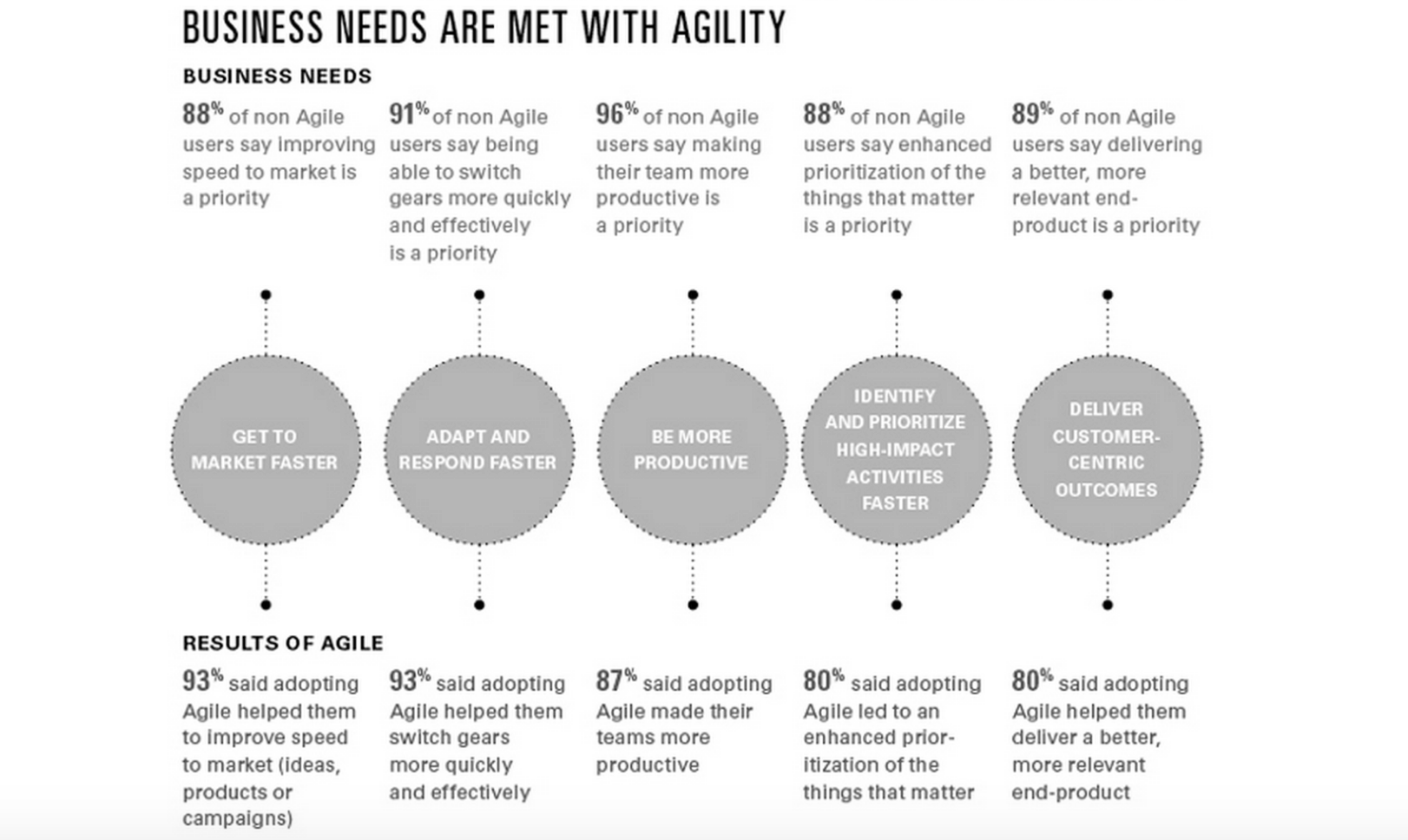Table of Contents
Agile became a “hot trend” these years. People used to associate Agile methodology with agile software development, but nowadays it is implemented in all departments and companies fight for the awards to be nominated as an “Agile company” or to be considered as a company that follows an agile process. And Apiumhub is not an exception.
We use agile methodology to manage all our projects in all our departments, we are 100% agile.
Why companies switch to agile methodology
In 21st century, everything changes extremely fast, it is very important to be flexible and adaptable to the market changes, to focus on business value and customer needs in productive and cost-effective way and “agile is all about that”.
The principles of agile, which are commonly used in software development can be applied to every other part of the business, including HR. Developing an agile culture can have the biggest impact on the company’s long-term success.
If we compare Agile scrum with well-known waterfall methodology, you can clearly see that it is a must to do the whole company Agile, because waterfall can not give companies this flexibility and adaptability as each stage needs to be completed before moving on to the next step. As it’s sequential, once a step has been completed, you can’t go back to a previous one, unless you decide to scratch the entire project and start over again. The major disadvantage of the waterfall methodology is that it doesn’t take into account how real life works, It’s impossible to foresee everything client will want in a project, as requirements will constantly be changing, market will be constantly changing, competitors will come up with new products and at the end you can work on your project several years and launch a product, which is not on demand anymore. Therefore, now the preference is – Agile, it makes much more sense now. Agile allows companies to be on the move, to follow new trends and do exactly what is on demand, taking into account client’s and market needs.
With Agile, the idea is that you do planning to get started and then you add more as you discover more as you progress. You are gathering requirements throughout the project cycle, designing as you go and implementing along the way. The agile methodology is an iterative, incremental process. You constantly work with customer feedback and it allows you to incorporate right changes before the next sprint starts.
Now Agile methodology is used a lot in Marketing, there is even a name for it: “ Agile Marketing” . As a CMO of Apiumhub, I want to share with you our own experience, how we do Agile Marketing. While most people associate Scrum to software development, we use scrum in marketing as well, it helps us to manage the projects, breaking complex initiatives into manageable small tasks. Scrum is all about featuring sprints, daily standup meetings, and a public “to-do” lists. Scrum is one of the most popular frameworks for implementing departmental agility as everything is interconnected and Marketing works closely with design department, design department works closely with IT department etc. In Apiumhub we use JIRA and TRELLO. However, there are other project management software available out there!
We came to the conclusion that the goal of Scrum is to provide a framework that creates a culture of transparency, inspection, and adaptation while making it easier for team members to produce consistently great products.
What Kanban offers is a clear means of prioritizing work, offering a transparent view of what marketing for example is working on, and maintaining a steady flow of manageable workloads across the marketing team. Kanban helps you to see the workload of today and of your sprint , working on small tasks and every time when you finish the task it is a big pleasure to put this task into a section “done”. It makes you satisfied. Kanban is a very good tool to organize tasks and a team. It is perfect to measure the efficiency of each single employee and a team as a whole.
Now CEOs opt for an Agile methodology in every single project, whether it is an IT or a Marketing project. CEO’s want to be Agile as a company as it is the direct way to be successful by satisfying customers through early and continuous delivery of valuable product and promoting sustainable development.
Agile makes companies successful for many reasons
- First-Mover advantage, be an innovator and not a follower. From my perspective of view this is the biggest advantage of agile methodology – have first-mover advantage over your competitors. While they’re busy planning and perfecting, you’re out there in the market making sales.
- Motivates the Team. Working at that speed, and iterating quickly is incredibly exciting and motivating for all employees. To see the progress is important for motivation, and working on the same project for months with nothing tangible to show for it can be quite demotivating.
- Involves Your Customers. Your customers get a constant sense that your company is growing because you keep releasing new features. It also allows you to adjust to customers demands, keeping them happy and with you longer.
Agile methodology applied to marketing
As I have a solid knowledge in Agile Marketing, I will tell you more about it, pointing out why Agile methodology here is excellent when it comes to management.
Agile Marketing is an approach to marketing that takes its inspiration from Agile Development methodology.
The goal of Agile methodology in marketing is to improve the speed, predictability, transparency, and adaptability to change of the marketing function.
Marketing teams love Agile. The reason is obvious: agile strives for simplicity, releasing things early and often, and iterating based on market reactions.
In Apiumhub, we support a set of principles and statements that expand upon what it means to be an Agile Marketer:
- Our highest priority is to satisfy the customer through early and continuous delivery of marketing that solves problems and creates value
- Changes. We believe that our ability to quickly respond to changes is our competitive advantage
- Transparency. Marketing team’s interaction with customers. Agile marketing encourages marketing teams to engage closely with customers.
- Great marketing requires close alignment with the business, sales and development and agile offers exactly that. Agile marketing allows management, sales and development to clearly see what marketing is working on. Sprint review meetings can also be used to summarize the tangible contributions of marketing and to see their efforts . Sprint planning meetings also allow other departments to provide input into marketing, requesting tasks and results.
- Communication also tends to improve, through the daily scrum meetings. Everyone knows what other people are working on and what obstacles they might be encountering.
- Experimentation and learning, through the build-measure-learn feedback loop, is an important factor of progress.
- Agile encourages new ideas, for messages and channels as well as processes. The beauty of the methodology is that these ideas can be quickly tested and integrated if they prove to be successful. At the heart of Agile is the goal of continuous improvement, on the individual level, the campaign level and the organisational level.
- Lower risk. As we work with 2 weeks sprints, it allows us to do the correction and adjustment after 2 weeks instead of waiting when the whole project is complete.
- Prioritization. Sprint Planning meeting requires that the stakeholders prioritize their requests, and all of them can see the resources available and discuss how those resources should best be deployed.
- Empowered teams. Our leadership encourages our teams to do what’s right for the customer. People feel empowered to share ideas and are supported to go and do these things. And this is very different from traditional marketing, in agile world, people feel like they can move fast with ideas they have because they’re not concerned that management may not support them. Also It’s fun! Agile marketing is a lot of fun. Gathering every day to talk about what you’re working on and sharing challenges with your team quickly builds team cohesiveness.
- One of the key values of agile marketing is measurement and accountability. Agile marketing teams run small tests, measuring the results, and investing more over time in what works. This emphasis on measurability improves marketing’s ability to communicate its contribution.
- Customer satisfaction. As customer needs are met quickly and customers get honest and clear information that they need to make a buying decision, customer satisfaction tends to increase.
- Agile Marketing drives long-term marketing strategies with short-term, focusing on customers and improving responsiveness and relevance. It allows us to come up faster with creative ideas, doing more testing, work on smarter improvements and achieve better results.
- Sustainable marketing requires you to keep a constant pace and pipeline
Nowadays, you can find formal studies comparing the productivity of agile versus non-agile marketing teams and marketers who adopt agile methodology report increased productivity:

According to the same report : “ employees working in agile environments report a greater overall sense of satisfaction and pride in their work due to feeling more empowered, greater clarity in how their role impacts the business, and a more collaborative work environment.”
Also, It’s good for the career. Agile marketing is beginning to get some traction. Google search for agile marketing increases a lot. Just as developers who deeply understand agile development are in high demand, marketers who deeply understand agile marketing and who have experience implementing agile marketing in organizations will be on demand.
As CMOs become more and more responsible for growth, they have an unprecedented need for speed and flexibility. In today’s always-on, always-connected market, those two factors equal a tremendous competitive advantage. With the pace of change in customer needs, the CMOs who figure Agile out first and best will outperform in their markets.
These days, there’s no more time to waste, and with easy access to data, CMOs have a choice: Be agile and use data to inform quick test-and-learn activities and rapidly adjust to the market or follow the status quo and “wait for perfect.” Marketers who wait to deliver a big splash are not taking advantage of real-time ways to infuse market feedback into the development process.
As Brian Potter may say in Phoenix Nights – Agile Marketing, it’s the future.
Shawn Dickerson, director of solutions strategy at enterprise work management company Workfront, points out that agile marketing can assist any organization, whether for-profit or not. He uses as an example one of Workfront’s customers, Northern Arizona University. After switching to agile, the university experienced, the following benefits:
- 20 percent cost savings
- 400 percent increase in productivity
- 95 percent sprint tasks completion rate
- 30 percent increase in client satisfaction rating
As a conclusion, I want to end up my article with my favorite quote:
Don’t just work faster, work smarter!
Don’t forget to subscribe to our monthly newsletter to receive latest news and best practices in agile development.
If you found this article interesting, you might like…
- Top business blogs to read
- Human-centered innovation
- Barcelona makes it to the top 5 of innovation hubs
- Top smart city projects to watch
- Blockchain technology: use cases, statistics, benefits, startups & events
- Barcelona; one of the best smart cities in Europe
- Disruptive innovation to track
- The era of unicorns
- Top 20 promising startups in Barcelona
- IOT projects that may change the world
Author
-
Ekaterina Novoseltseva is an experienced CMO and Board Director. Professor in prestigious Business Schools in Barcelona. Teaching about digital business design. Right now Ekaterina is a CMO at Apiumhub - software development hub based in Barcelona and organiser of Global Software Architecture Summit. Ekaterina is proud of having done software projects for companies like Tous, Inditex, Mango, Etnia, Adidas and many others. Ekaterina was taking active part in the Apiumhub office opening in Paseo de Gracia and in helping companies like Bitpanda open their tech hubs in Barcelona.
View all posts









